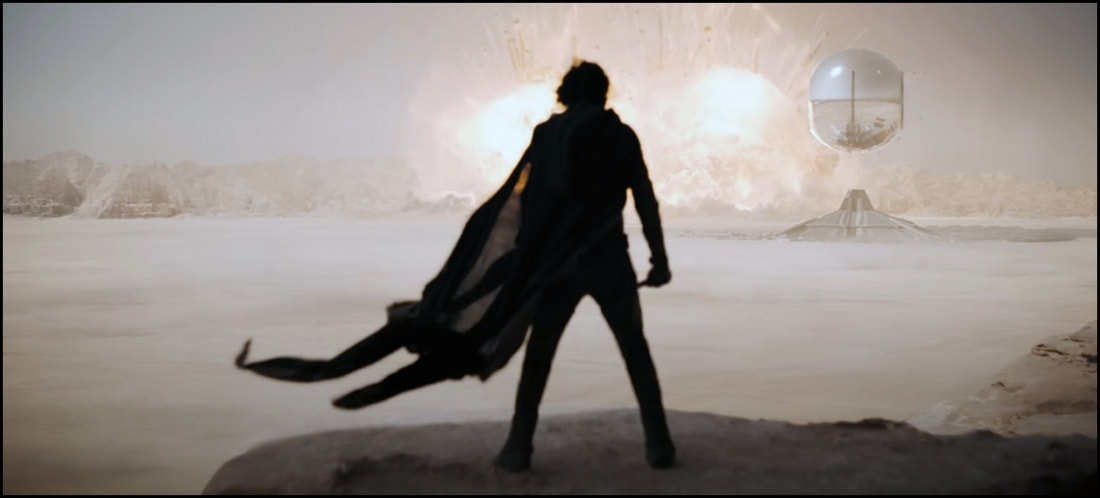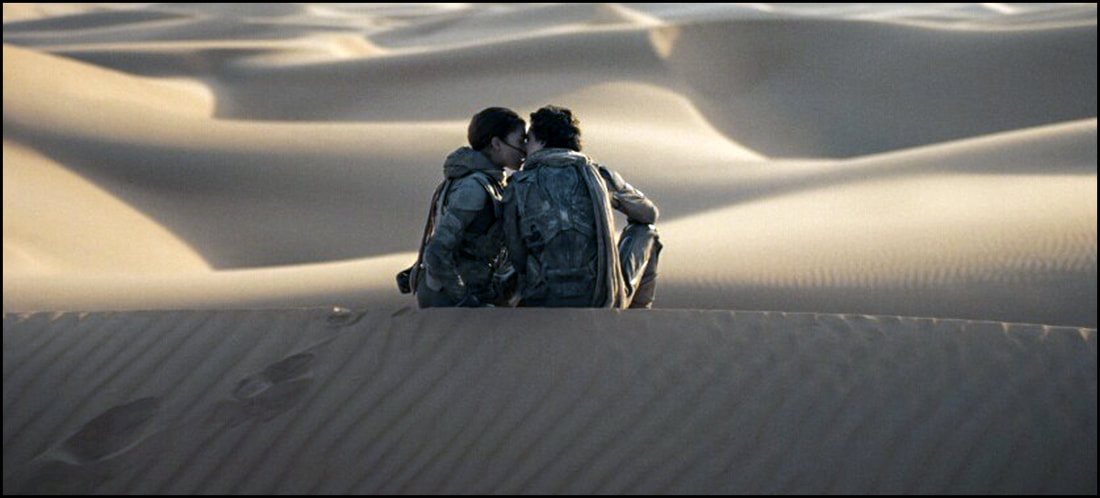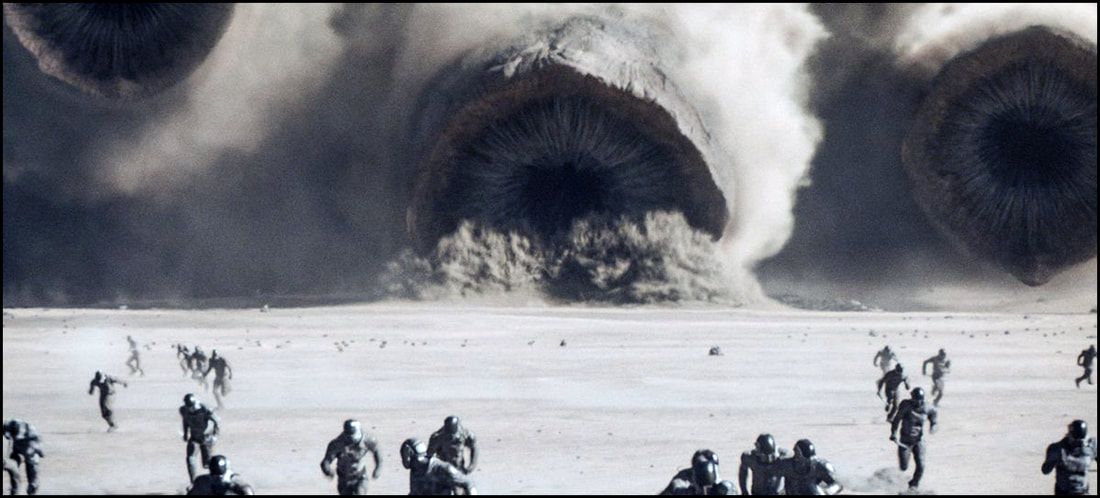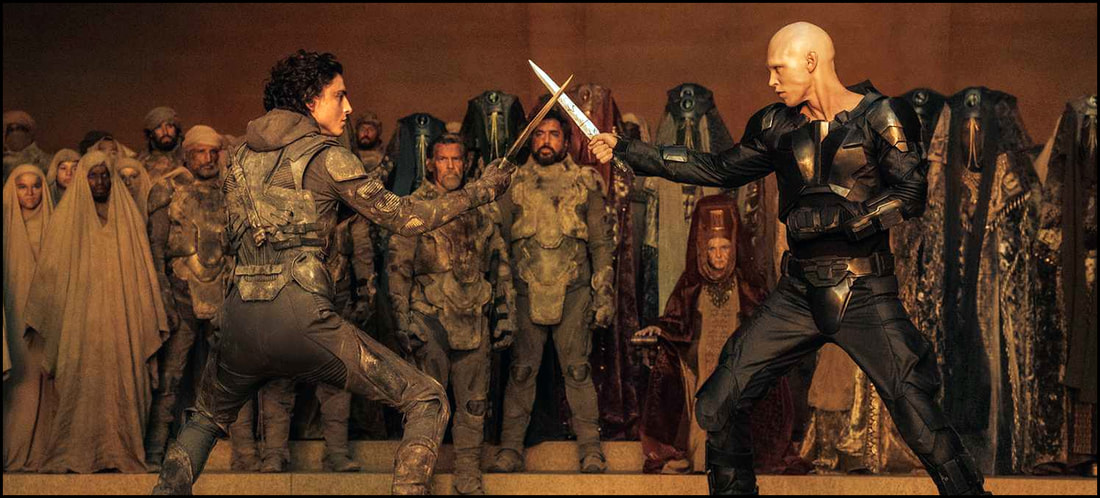From the film’s IMDB.com page citation:
“Paul Atreides unites with Chani and the Fremen while seeking revenge against the conspirators who destroyed his family.”
OK, folks, here’s my ‘thang’ on the whole Dune intellectual property. I said this all the way back with the original 1984 film adaptation by David Lynch as well as with director Denis Villeneuve’s first installment in 2021, and I’m doubling down on it with the big screen theatrical release of Dune: Part 2 which I’ve just seen in theaters. So here it is:
Dune is best discussed and best appreciated by those who are established long-term fans of the franchise or the most ardent fans of pure Science Fiction … and just about no one else.
Now, take heart: I’m not saying that casual moviegoers or a random audience member or two will find nothing to like in the motion picture because that’s far from the truth. At this point in the director’s career, it really should go without saying that Villeneuve is a master with the camera; his cinematography – along with the overall look and texture of his stories – is truly in a class all of its own. In fact, he’s so damn good that I personally could get behind damn near every Science Fiction project in the pipeline anywhere hiring him – minimally – in the role of a consultant as it’s pretty definitive that he knows how to give such pictures an astonishing amount of visual depth in even the simplest terms. When a film rises off the screen as this one does, there’s very little more that has to be done to achieve mythological scope. It may not be ideal for every I.P., but – again – what could his contributions hurt?
So when you tell me that Dune: Part 2 reached some great box office numbers and yet still fell short of what the studio expectations were, I’m apt to point out that the film’s spectacle – like any theatrical spectacle – will only stretch so far on positive word-of-mouth. Hearing one person describing the experience as “incredible to watch but I had no idea what was going on at times” will not put legs beneath its torso no matter how many times you or I or other fans might climb the clock tower and scream at the masses that this is one for the ages. They – like us – are free to make up their own minds; and – while they might take it in once – they’re not bloody likely to sign aboard for any return engagements.
And … in Hollywood … it’s the ‘return engagements’ that make a blockbuster into a blockbuster.
Just ask Marvel … well, Marvel of about ten years ago, that is.
Spectacle without accessibility is the stuff of Marvel that’s doubled down on social messaging, chucking out superhero after superhero that audiences aren’t interested in listening to sermons from. When the bulk of society still goes to the cineplex for pure escapism, Dune: Part 2 both does and doesn’t fit the bill because of the vastness of its intricacy. This isn’t any indictment on its efficacy; it just isn’t a property that’s intended for all parties, and that’s likely going to keep it from touching that legendary status even its Paul Atreides is owed.
Also, as I said when both reviewing and discussing Villeneuve’s first installment, I’ve always found it difficult to assess incomplete stories, meaning that I had a lot of hesitancy in aggregating mky thoughts on Part 1. It was clearly a set-up picture – a tale with no ending in sight – and, to a lesser degree, the same could be said about Part 2. While the film draws to an effective close around circumstances introduced in the Herbert novel, there’s also a rather obvious hook for much more to follow in, yet, a third chapter. (For the record, Villeneuve has stated he has every intention of bringing the events of “Dune Messiah” to the masses, but who knows how long that might be? He has further suggested he needs a break from this literary universe, and I’ve not personally read that the studio has fully committed to another picture.) Still, I’m inclined to give it my best in this space.
Where I think Villeneuve and company begin to stray from the path gets into rather muddied waters (snicker snicker), and it’s difficult to point to any single incident that derails the film’s progress, though I can mention a few guilty culprits.
First, Lady Jessica’s attempts to both force her son into this role as well as conscript the ‘weakest of the Fremen’ (her words, not mine) give the film a relative cheapness I didn’t quite expect. She’s eventually appointed their high priestess, a position that already puts her in control of her son and the people’s shared destiny, so why Villeneuve sought to so obviously make her into a kinda/sorta religious ‘snake oil saleswoman’ seems a bit of a misstep to me. Granted, there is a foundational reason why the lady might embrace such evil deeds tied directly to her heritage; but, again, it comes across here as so heavily orchestrated one wonders what happened to all the nuance the director was layering on so thickly elsewhere and why a little couldn’t have been spared for these expansions.
Second, Villeneuve’s adaptation leaves out a rather significant character from the Herbert novel, one that fleshes out events from the book in relevant ways: Jessica’s birth of Alia – Paul’s sister – is nowhere on the screen, and – as such – the director has to twist one of the project’s biggest reveals onto her brother’s visions, a development that feels inorganic and rushed. Yes, yes, and yes: I’ve read some commentary suggesting that this was intended to be a cinematic moment not dissimilar to Darth Vader revealing to Luke Skywalker in 1980’s The Empire Strikes Back, but my problem there is that the surprise can at that young Jedi’s lowest moment of record, while Paul pretty much cries this out as a crowning achievement. Tonally, it just didn’t work – think, instead, of Luke proclaiming to Darth “you are my father” as opposed to the way it was delivered, and you see why this handling might be a bit problematic.
Fourth … and this one might be a bit controversial, readers, so buckle up: I can’t help but suggest that Zendaya was the weakest link in all of these female faces. Her stint as Chani – Paul’s love interest among the Fremen – feels more like a teenage crush than it does a love affair meant to transcend time, space, and the ages. She’s hardly a ‘Juliet’ to his budding ‘Romeo’ in any estimation; and – at times – it felt like all she could accomplish here was to sit or stand around, take up space, and give the camera a hard glance whenever the director asked her to. While textually she can’t be Paul’s equal, she needed to give a stronger performance here – one of a woman seriously smitten as well as a ‘young Turk’ rebelling against her personal destiny (under this adaptation’s design) – in order to give their relationship the weight it carries in the novel. (FYI: from what I understand in the book, Chani’s just as influential in Paul’s rise to power as is Jessica, but that’s hardly the case here.)
As you can see, Dune – despite the director’s best efforts – remains a bit of a rabbit hole where only angels (or, as I said, the property’s ardent fans) fear to tread. While I’ve no troubled conceding that this is likely the best treatment the novel has had to date, I’ll still hold out hope that someone – be it Amazon Studios, Netflix, or some other streaming service – will seize the property and give it the serialized treatment it inevitably deserves. Once more, such an attempt might not reach mainstream success, but it might finally give the intellectual scope of Herbert’s ideas the attention they so rightfully deserve.
Recommended, but …
In the interests of fairness, I’m pleased to disclose that I’m beholden to no one for my thoughts on Dune: Part 2 as I saw this one all of my own accord at my local theater.
-- EZ





 RSS Feed
RSS Feed